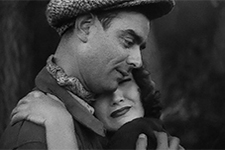Toni
|  Jean Renoir’s Toni is set within an immigrant community in the south of France, a setting that virtually demands the very naturalistic approach that Renoir took. Leaving behind the studio-bound aesthetic that had largely defined his films up until that point, Renoir dove deep into a grand “experiment,” shooting the film on location with a cast composed almost entirely of nonprofessional actors. Renoir sought a kind of realism of location and character that had rarely been attempted at the time, and the film is not surprisingly often viewed as a crucial forerunner of Italian neorealism, the epitome of the post-World War II turn toward a cinema that more accurately (both aesthetically and politically) reflected the lived experiences of ordinary people. All of the action in the film transpires in and around Martigues, Bouches-du-Rhône, a port city between the Mediterranean Sea and the Sea of Martigues. Renoir opens and closes the film with the arrival of a train full of recent immigrants—primarily Italians and Spaniards—who are looking for work in the area’s quarries and vineyards. One of those people in the film’s opening scene is Antonio “Toni” Canova (Charles Blavette), a young Italian immigrant who finds work in the nearby quarry and takes up residence in a boarding house run by Marie (Jenny Hélia), with whom he subsequently becomes romantically involved. Toni, however, is a restless soul, and soon his attention is drawn to Josefa (Celia Montalván), a Spanish immigrant who has also attracted the attention of Albert (Max Dalban), the boorish foreman at the quarry. Toni has a friend in Fernard (Édouard Delmont), an older man who recognizes Toni’s personal shortcomings and follies, but supports him nonetheless because he is a decent and forgiving soul. Despite being married to Marie, Toni still longs for Josefa, who finds herself trapped in an abusive marriage to Albert and then engaging in an affair with Gabi (Andrez), her young and self-centered cousin. The film veers into Hitchcockian thriller territory in its third act with a murder, a cover-up, and a character attempting to take the blame to protect another. And did I mention there is also an attempted suicide? Despite its brief running time, Toni packs a lot of melodrama, and at times it feels decidedly overcooked. Renoir wrote the script based on a true-crime case compiled by Jacques Levert, a pseudonym for Jacques Mortier, a friend of his who worked as a police commissioner and originally intended to use the material for a novel. Toni has a number of Renoir’s distinct touches, notably some beautifully sustained tracking shots and a balance of emotional intimacy and humor. The cast of nonprofessional actors gives good, natural performances that blend seamlessly with the unadorned locations. There are a few moments of graceful artistry that break from the general air of bare realism, notably a scene where a character takes a boat out onto a lake, and as she moves along the edge of the lake blends in with the sky, giving her the appearance of floating in a void. Despite the film’s aesthetic accomplishments, though, it is difficult to become too deeply involved in the story simply because none of the characters are terribly appealing and they tend to bring out the worst in each other—Toni’s narcissism accentuates Marie’s victimhood, while Albert’s sadism turns Josefa’s flirtatious liveliness into sour desperation. As always, Renoir gives the film an indelible sense of humanity, but its story is simply too slight to make the film much more than a curious forerunner to the masterpieces that Renoir would make—Grand Illusion (1937) and The Rules of the Game (1939)—just a few short years later.
Copyright © 2020 James Kendrick Thoughts? E-mail James Kendrick All images copyright © The Criterion Collection | |||||||||||||||||||||||||||||
Overall Rating: 

 (3)
(3)


